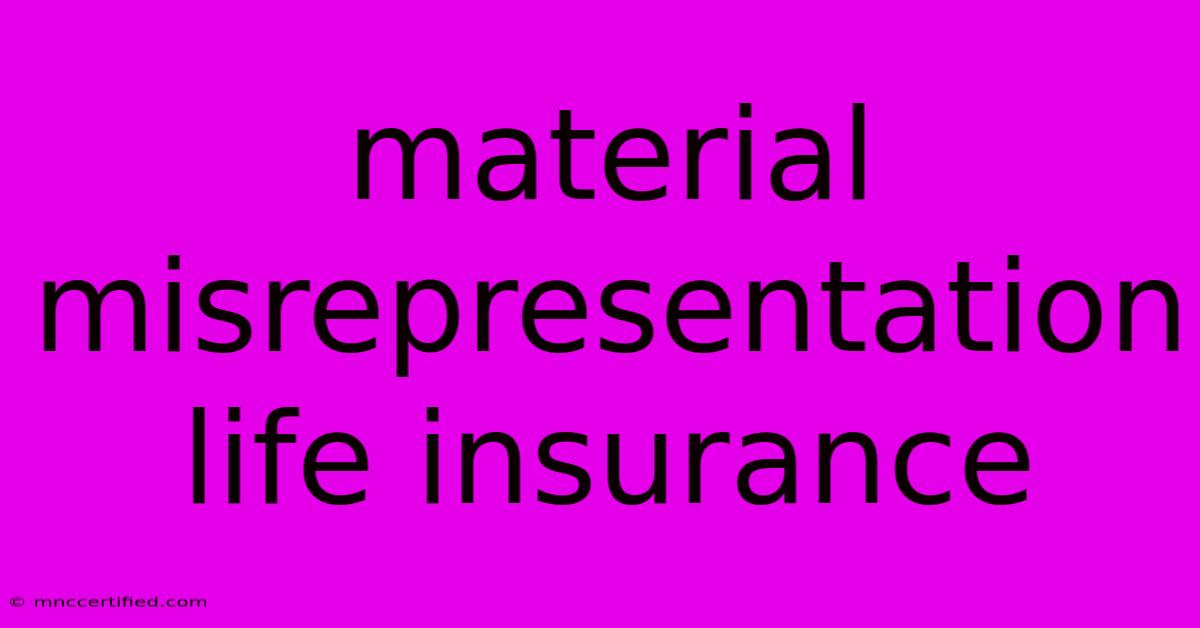Material Misrepresentation Life Insurance

Table of Contents
Material Misrepresentation: The Risk of Untruths in Life Insurance
Life insurance is a crucial financial safety net for loved ones, providing peace of mind in the face of loss. However, the very foundation of this protection relies on honesty. Material misrepresentation—the act of providing false or misleading information during the application process—can have severe consequences, potentially jeopardizing the entire policy.
What Constitutes Material Misrepresentation?
"Material" refers to information that significantly influences an insurance company's decision to issue a policy or set its premiums. This can include:
- Health History: Lying about pre-existing conditions, illnesses, or medical treatments, especially those related to risk factors like heart disease, cancer, or diabetes.
- Lifestyle: Concealing risky habits like smoking, drug use, or dangerous hobbies.
- Financial Situation: Making false statements about income, assets, or debts that affect the policy's affordability.
- Employment: Hiding important details about your profession or work environment, especially if they involve high-risk occupations.
Consequences of Material Misrepresentation:
- Policy Denial: If an insurance company discovers material misrepresentation, they have the right to deny your application altogether.
- Policy Rescission: Even if the policy was issued, the insurer can cancel it retroactively, meaning they will not pay out any benefits upon your death. This means your beneficiaries receive nothing.
- Legal Action: In some cases, insurance companies may even pursue legal action to recover any premiums paid.
- Reputational Damage: You may face difficulties securing future insurance policies due to a record of misrepresentation.
Examples of Material Misrepresentation:
- Claiming to be a non-smoker when you are a heavy smoker.
- Failing to disclose a previous cancer diagnosis.
- Exaggerating your income to qualify for a higher coverage amount.
How to Avoid Material Misrepresentation:
- Be Honest and Complete: Provide accurate and thorough information on your application.
- Read Carefully: Pay close attention to all questions and understand the potential consequences of misrepresentation.
- Consult an Agent: Seek guidance from a knowledgeable insurance agent who can clarify any doubts and ensure you provide accurate information.
- Review Your Policy: After receiving your policy, carefully review it to ensure all details are accurate and reflect your provided information.
Protecting Yourself and Your Loved Ones:
Honesty is the cornerstone of a secure life insurance policy. Be upfront and transparent during the application process. It may seem tempting to exaggerate or withhold information, but the potential consequences far outweigh any perceived benefits. By being truthful, you can ensure the security and protection of your loved ones in the long run.
Disclaimer: This article is for informational purposes only and does not constitute legal or financial advice. Consult with a qualified professional for personalized guidance on life insurance and legal matters.

Thank you for visiting our website wich cover about Material Misrepresentation Life Insurance. We hope the information provided has been useful to you. Feel free to contact us if you have any questions or need further assistance. See you next time and dont miss to bookmark.
Featured Posts
-
Livestream Red Star Belgrade Vs Opponent Champions League
Nov 07, 2024
-
Stranger Things Season 5 2025 Release Episode Titles List
Nov 07, 2024
-
Prop 36 Impact California Prosecution Changes
Nov 07, 2024
-
Us Election Results Map Trump Victory
Nov 07, 2024
-
Bayern Munich Benfica Kick Off Delayed Details
Nov 07, 2024